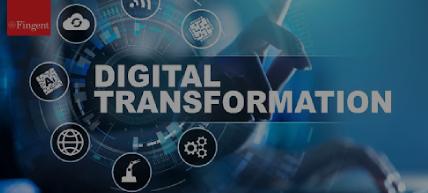Know Your Position
What stage of digital transformation are you currently in?
Digital transformation is a journey across three stages: digitization, digitalization, and finally, digital transformation. Successful digital transformation requires business to gradually move from the first stage to the last, without rushing hastily to the final stage.
Stage 1 : Digitization
- Conversion of analog (manual) information into digital format, so it can be manipulated, stored, and transmitted easily.
- Example: Conversion of paper forms into electronic documents.
Stage 2 : Digitalization
- Leveraging digital technologies and digitized data to enable or improve business processes.
- Example: Using a marketing website, software, or mobile app to stay connected with customers and employees.
Stage 3 : Digital transformation
- Application of new and emerging technologies to make fundamental changes across all aspects of business, by driving sustainable innovation and creative growth.
- Influences the entire enterprise - from branding to operations, including what the business offers, how they interact with customers, and how they operate.
- Example: Gleaning insights from customer data, behavioral patterns, and purchase history to recommend personalized products or services.
Knowing where you are in the DX journey is the first step to achieving successful digital transformation.
Assess Your Readiness
Checklist for organizations to assess digital transformation readiness
- Clearly defined strategic vision mapped to the organization’s digital needs
- Senior executives and leadership have a clear understanding of their company’s digital capabilities and business objectives
- Strong digital leadership to define the strategy by overcoming complexities
- Encouraging new ways of thinking and solutions from different perspectives
- Learning from risks and failures to make strong comebacks
- Rewarding innovation and overcoming cultural resistance to change
- Adequate IP assets to implement strategic vision
- Using software already to improve performance, operations, customer understanding, supplier interactions, and product know-how
- Availability of digital expertise, technical talent, visionary and innovative skills within the company to define the right digital strategy
- Assessing and grading workforce based on their understanding and level of digital transformation knowledge
- Ability to overcome the lack of skills needed to execute digital transformation strategy
- Willingness and ability to fund strategic digital initiatives with unpredictable returns
- Readiness to redesign existing revenue streams and business models to secure profit in the long run
- Software and technology investments made over the past three years
Readiness to invest in the following technology assets:
- Big data
- Data mining and analytics
- Cloud computing
- Mobile technologies
- Internet and wireless communications
- Other technology assets needed to implement strategic vision
Approaching Digital Transformation
Checklist for organizations to approach digital transformation
- Determine the business areas that will be affected
- Specific technologies to be implemented for transformation
- What goals the transformation intends to achieve
- Analyze the potential changes and impacts on processes, systems, and culture
- Obtain buy-in from all the key stakeholders, including senior leaders and employees
- Evaluate the current IT infrastructure
- Identify the gaps to be closed in skills and capabilities
- Determine the level of digital literacy (both existing and required) across the organization
- Define a timeline to execute the transformation project
- Identify the resources and assets needed for transformation
- Set clear milestones to accomplish the transformation journey in a phased manner
- Select and integrate the appropriate technologies, including cloud computing (SaaS, PaaS, and IaaS models), Artificial Intelligence, Analytics, Robotic Process Automation (RPA), and the Internet of Things (IoT)
- Track the key performance indicators to measure the impact of transformation on your company
- Make the required adjustments and customizations that will make your digital transformation journey successful and effective
- Promote a culture of innovation, learning, and continuous improvement
- Encourage experimentation and empower employees to adapt quickly by mitigating risks
- Develop the flexibility to roll with the punches as digital transformation projects are expected to break new ground
- Embrace or generate new revenue streams with the right vision and approach to transform
Fingent - The place where CUSTOM SOFTWARE that shapes a business is created
Create Your Custom Software Blueprint With The Experts
Solving Business Problems
Leveraging digital transformation services to solve business challenges
- Replaces tedious and time-consuming manual processes and tasks with simple and systematic digital solutions
- Enables organizations to break away from stale marketplaces and noticeably distinguish themselves from competitors
- Improves the ability of a business to act more responsively to unforeseen changes and adapt to rapidly changing marketplaces
- Replaces unfeasible traditional business approaches with modern techniques to keep up with the constantly evolving customer needs and trends
- Innovative business automation technology helps overcome performance limitations and inefficient workflows
- Sophisticated level of data intelligence allows organizations to get rid of the inefficiencies in decision-making
The Advantage
Business benefits of digital transformation services
- Operational improvements will create greater value for business, customers, employees, and partners
- Deeper analytics-based actionable insights allow business leaders to make more informed decisions
- Automation and integration of innovative technologies lead to faster and more efficient processes
- Enables better resource management by consolidating applications, databases, and software into a single corporate intelligence repository
- Optimized and slicker business processes, workflows, and collaboration lead to enhanced safety, quality, and productivity
- Plenty of cost-saving opportunities for businesses to cut recurring and capital expenses and achieve better returns on investment
The most sustainable advantage of digital business transformation is the agility you have over others.
ROI Considerations
Measuring and improving ROI of digital transformation services
Steps to Calculate Digital Transformation ROI
- Identify the project initiatives
- Review business objectives
- Define investment metrics
- Determine value metrics
- Set a timeframe for project completion
- Develop an ROI model in advance
- Drive cultural change by spreading the word
- Take time to plan and set realistic expectations
- Evaluate technologies carefully to ensure long-term ROI
Planning your digital transformation project with an experienced digital strategy consultant will fetch you benefits that outweigh expenses.
Transformational Technologies
Technologies that drive digital transformation
- Cloud computing - IaaS, PaaS, and SaaS
- Robotic Process Automation
- Artificial Intelligence and Machine Learning
- Big Data
- Real-time Analytics
- Augmented Reality
- Virtual Reality
- Internet of Things and 5G
- 3D Printing
- Digital Twin
AI in Digital Transformation
Artificial intelligence plays a key role in digital transformation
- Intuitive customer experiences and deeply personalized services driven by AI recommendation engines, chatbots, and smart case classification tools
- ML-trained engines and AI-powered security technologies enable businesses to combat cyberattacks and respond faster to data breaches
- Automation of labor-intensive workloads and routine tasks to reduce human errors and make productivity gains
- AI-driven sales can accelerate the lead-to-cash process by shortening sales cycle, producing repeat customers, and increasing speed-to-market
- Inventory and resource optimization by predicting business performance and forecasting demands
- AI-powered digital transformation HR initiatives streamline the employee lifecycle from recruitment and onboarding to talent acquisition and management, including employee upskilling, learning and development
- Data collection and predictive analytics to mine meaningful business insights
Consulting & Strategy
Digital transformation consulting services
Digital transformation consulting is a set of services offered by digital consulting experts like Fingent to improve the customer experience, business operations, experience design, and market transformation of companies.
Digital consultants analyze an organization’s requirements, existing resources, and their ability to scale, in order to recommend the right digital technologies, tools, processes, and platforms that can reimagine their business for the digital age.
Bottom-line benefits of digital transformation consulting:
- Faster and higher ROI by aligning digital strategy with corporate strategy
- Deep data analytics offers new insights to increase sales, customer loyalty, and customer experience
- Enables organizations to deliver an omni-channel brand experience by breaking down departmental silos
- High-impact selling experiences and low-touch transactions enabled through new digital sales channels
- Digitally enabled features improve the value of products and services, transform customer experience, and increase marketing ROI
Fingent - The place where CUSTOM SOFTWARE that shapes a business is created
Create Your Custom Software Blueprint With The Experts
Success stories
Digital transformation success stories
1. Light-touch AI solution to streamline workers’ insurance claims processing
Ambit, an AI machine learning program developed by Fingent, simplifies the time-consuming steps involved in the processing of workers’ compensation claims. Combining artificial intelligence and machine learning logic with our client’s litigation strategy, the light-touch AI solution enables attorneys to balance time, money, and cases in hand.
- Smart data extraction, intuitive dashboards, and contextual analysis
- Average case settlement time cut to 1-2 days from 3 years
- 57% reduction in costs for insurers, claim administrators, and carriers
2. Integrating customized design with the latest technologies to enable smart e-locker management
VLocker, a leading provider of electronic lockers for click-and-collect e-commerce delivery and fulfillment, partnered with Fingent to develop a complete and robust software suite for their lockers that could be scaled to multiple industries, user categories, and locker applications.
- Optimized last-mile delivery - 50% reduction in internal workloads
- Streamlined parcel delivery tracking and locker monitoring
- Timely alerts on delays and hardware failures
3. Customized transportation management system to reimagine logistics and supply chain operations
Texas-based Cheetah Transportation Systems collaborated with Fingent to build a personalized and lean transportation management system that helped accelerate their digital transformation journey and secured them a sustainable competitive advantage.
- Streamlined and accelerated ordering, tracking, and delivery processes
- Cut licensing and subscription costs by eliminating complex third-party software integrations
- 30% improvement in Turn Around Time (TAT)
- 40% time-savings attained through automated tasks and real-time reporting
Our digital transformation success stories spell out how your peers are keeping their brand relevant in fast-changing times.
Insights
More Insights on Digital Transformation Services

A Detailed Guide to Understanding Digital Business Transformation
Digital transformation is the process of integrating digital technologies to create a new business model or modify existing business processes to meet changing business requirements.










































